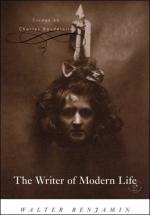|
This section contains 5,877 words (approx. 20 pages at 300 words per page) |

|
SOURCE: "Paradise Regained: The Flaneur, the Badaud, and the Aesthetics of Artistic Reception i Le Poeme du haschisch," in Nineteenth-Century French Studies, Vol. 24, No. 3 & 4, Spring-Summer, 1996, pp. 388-97.
In the following essay, Wettlaufer contends that Le Poème du haschisch serves as an outline of Baudelaire's aesthetic philosophy as well as his statement about the tenuous benefits of drug experimentation.
Les Paradis artificiels is generally acknowledged to be the only published work that Baudelaire himself considered complete and definitive; in a letter to editor Julien Lemer he maintained, "je trouve le livre bon comme il est, je n'y ajouterai rien, je n'en retrancherai rien" (Correspondance 2: 442).1 Yet the two essays that constitute Les Paradis artificiels are too often dismissed as a peculiar hybrid of self-referential moralizing (Le Poème du haschisch) and idiosyncratic translation (Un Mangeur d'opium). While the volume shares some thematic similarities and possibly even a structural affinity...
|
This section contains 5,877 words (approx. 20 pages at 300 words per page) |

|


